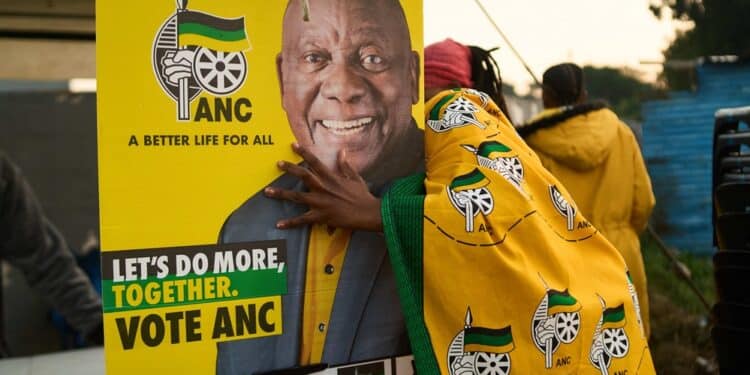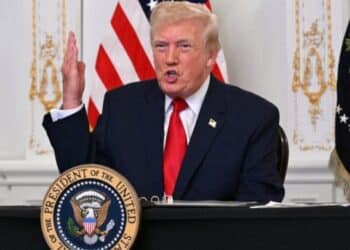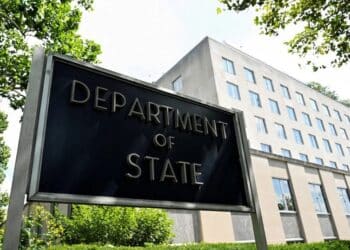The African National Congress (ANC), previously led by Nelson Mandela, has suffered a severe setback as it has lost its absolute majority for the first time. The party has dominated South African politics since the ANC emerged victorious thirty years ago in the first post-apartheid elections.
Predicted by polls before Wednesday’s elections, the ANC was prepared for a dismal result, but the figures are far more sombre. Voters gave it 40% of the vote, down from 57% in 2019.
Tessa Dooms, a director at Rivonia Circle, a think tank in South Africa, said it was a historic result that diminished the ANC’s three decades hold on power. “The election in South Africa is an important watershed moment that fundamentally changes politics,” she said.
The constitution states that the party receiving the most votes has two weeks from the confirmation of the results to create a new government. In order to stay in power, the ANC will now need to form a coalition government with one or more opposition parties for the first time.
For millions of individuals, driving the party’s diminishing support is an all too grim reality.
With 32% of the population unemployed and alarmingly high rates of crime, South Africa continues to be one of the most unequal nations on earth. Critics of the ruling party’s government are becoming more and more irate over issues including corruption, shortages of water and energy, and other issues.
The initial gains made after being freed from white-minority control have not, in the opinion of many, been maintained. Even in the most industrialised country in Africa, despite notable advancements, inherited
The initial gains made after being freed from white-minority control have not, in the opinion of many, been maintained. The most industrialised country in Africa has made great strides, but the apartheid-era inequality has persisted and gotten worse over the past ten years. Since 2004, the party’s vote share has decreased by a few percentage points in each election. This decline has been made worse by the generational gap, since younger voters, known as “born frees,” who were born after apartheid, are less inclined to support the ANC.
“On the one hand, we overcame apartheid as a structural force,” Dooms said, “On the other hand, we have not actually changed many of the dynamics. We inherited inequality of one form, and we have doubled down on inequality in South Africa and another form going forward and it has hurt us.”
But in this election, the gradual decline in the party’s support over the last 20 years grew more dramatic, Dooms said. “The ANC has in some ways imploded in the form of its former president, Jacob Zuma. The rise of the MK is certainly the biggest story of this election.”
ANC: The fall and rise of Zuma
The election’s main topic was the uMkhonto weSizwe party, or MK, founded by the contentious and convicted former ANC leader. MK was founded just six months ago and was named after the ANC’s now-dissolved military branch. However, the party has quickly exceeded all expectations. Numerous former ANC members as well as a base of primarily impoverished Zulu South Africans who followed Zuma’s example and quit the ANC helped to strengthen the party. At roughly 15%, it is currently the third-largest party in South Africa.
It ends the 82-year-old leader’s remarkable decline and ascent. Despite the fact that his conviction prevents him from running for office in parliament, as MK leader, he has the ability to influence the formation of a new coalition government and may use this influence to try to prevent a conviction in the future.
2018 saw Zuma’s forced resignation as president, and in 2021 he was found guilty of omitting to appear for a corruption trial in which he was accused of participating. In addition, he will face a new trial for wrongdoing in a 1999 suspected arms sale the following year.
The populist leader has claimed that President Cyril Ramaphosa, his successor, is the source of his legal issues. Now that Zuma has dealt his opponent a serious blow, members in his party will probably put pressure on him to step down.
Duduzile Sambudla, an MK member and Zuma’s daughter, implied that a coalition would not be possible without Ramaphosa when she told NPR that “the MK is not willing to go into a coalition with the ANC of Ramaphosa.”
In KwaZulu Natal (KZN), the province with the second-highest population in South Africa, the MK’s victory over the ANC is particularly noteworthy. In a landslide victory, the party received about 46% of the vote against the ANC’s roughly 18%.
Icon of liberation When Nelson Mandela was elected president in 1994, he cast his first ballot at Ohlange High School in Durban, KwaZulu-natality. Many voters at the same voting place thirty years later expressed a similar unhappiness with the status of the nation and a desire for change.
Nqobile Khumalo, 24, was casting her first ballot when she came at the polls shortly after they opened on Wednesday at 7 a.m. She remarked, “We just really hope that there will be change.” The 39-year-old Tracy Bongiwe Zondo continued. She declared, “I need a change in our community. I was voting for the ANC before, but now I’m voting for MK.”
The future of President Ramaphosa is still uncertain. He has presided over the biggest decline in his party’s percentage of the vote (17%), is the first ANC president to lose the majority, and has seen a drop in turnout to 58 percent. Ramaphosa will not resign, according to Nomvula Mokonyane, the ANC’s head of elections, who spoke with NPR. “There won’t be any resignations,” she stated. If Ramaphosa is able to create a government that will probably cause division based on the results, he will face a significant task to surviving the remainder of his second term.
New era of coalition government
Professor David Everett at Wits School of Governance said the result forcing the ANC to partner with another party was a positive step for the country. “I think the ANC suddenly having to be accountable rather than having majority after majority will be an exceptionally good thing for South Africa,” he said.
Coalition governments have long existed on the local level in South Africa, but never at the federal level, and the makeup of an ANC-coalition government is now the big question.
The party could align with the official opposition Democratic Alliance, a center-right party, largely led and supported by the white minority in South Africa which won close to 22%. “There are two factions in the ANC. The one led by President Ramaphosa is much more concerned with the state of the economy and quite likely to look to the Democratic Alliance,” Everett said. But the move could alienate many in the ANC’s other faction who would consider it a red line.
The ANC could also align with the MK, giving Zuma influence in the government, or with the radical left-wing Economic Freedom Fighters party, led by another former ANC youth leader, Julius Malema. The party came fourth with 9% of the vote, also affected by larger-than-predicted support for the MK party, some experts said.
But a coalition with either or both parties, which largely emerged from the the party, could prove volatile, amid the divisions that led the parties to breakaway in the first place. “To go into a coalition with your sworn enemies in the EFF and MK, you are asking for politics to dominate everything, as they try to wreck the ANC even more and take it over,” Everett said.
The ANC transitioned from a beloved liberation movement to a political force that has dominated South African politics. But its hold on South African politics is diminishing, as it struggles to contain its divisions and address the country’s major challenges.
South African politics may have just changed permanently, from an era of one party rule. Within the country’s proportional representation system, more parties and independent candidates than ever are forming and providing an alternative — a reality the ANC must now grapple with.










